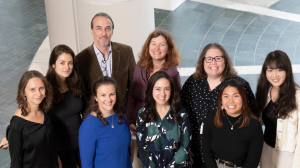New Gift Continues Work to Advance Understanding and Treatment of Misophonia
In a remarkably short period of time the Duke Center for Misophonia and Emotion Regulation (CMER) has become an international leader in advancing research, education, and treatment for people with misophonia and difficulty regulating emotions.
In recognition of the valuable contribution CMER is making to demystify misophonia and help those who suffer from it, Duke has received a new $1.25 million, five-year gift from an anonymous family that builds on their previous commitment, which established the Center in 2019.
CMER was founded by Zachary Rosenthal, PhD, associate professor in psychiatry and behavioral sciences at Duke University School of Medicine as an outgrowth of research he began more than a dozen years ago.
“Misophonia is a painful and challenging condition experienced in our family, and reliable treatment resources have been elusive,” a member of the donor family said. “Meeting Dr. Rosenthal five years ago was relieving, given his unwavering commitment, intelligence, and leadership in misophonia research. His collaborations with exceptional scientists through CMER have consistently impressed us, reinforcing our commitment to funding this group for evidence-based treatment development.”
Misophonia is a condition characterized by an acute nervous system response to certain repetitive sounds, such as chewing, throat clearing, or keyboard tapping. People with misophonia can experience a range of responses to these triggering sounds, from mild discomfort to intense and overwhelming anxiety, anger, or panic. In moderate cases, misophonia can interfere with normal daily activities; in severe cases it is debilitating, seriously disrupting work and school life, relationships, social activities, and more. Initial work done by CMER estimates that about 12% of people have moderate to severe misophonia.
CMER is one of a handful of centers around the world, and the only U.S. center, focused on education, clinical services, and research characterizing the causes, classification, and effective treatments for misophonia.
“In my view CMER is the heart of misophonia research,” said Jennifer Brout, PsyD, a psychologist based in Connecticut and the director of the International Misophonia Research Network. “Dr. Rosenthal researched this condition under the name ‘auditory over-responsivity,’ long before misophonia was studied at any university or institute. He is a leader in the field who has become a close friend, whom I trusted with funding from my own family foundation in 2008. At that time no other psychiatry department was willing to study auditory over-responsivity or sensory processing. He has done so much for the field. I am excited to see what comes next.”
In addition to the fundamental issue of defining misophonia, CMER is taking a multidisciplinary approach to developing treatments and tools to measure misophonia while sharing its findings broadly. As part of this work, the team is determining whether brain-based interventions might be helpful and actively designing treatments using behavioral interventions, including the development and pilot testing of cognitive behavioral therapies for misophonia. When published, these will be the first publicly available treatment guidelines for individuals with misophonia. While more definitive follow-up studies are needed, this work marks a fundamental shift in the global approach to treatment of misophonia.
“Without Dr. Brout’s vision and the support of this family and the many other donors who give what they can, this work would not be possible,” said Rosenthal. “With the family’s continued commitment, we have been able to jump-start discoveries about the nature and treatment of misophonia. We are changing people’s lives and bringing hope. It’s an enormous and humbling privilege and I am forever grateful.”
Research goals for the next few years include developing a better estimate of how common misophonia is; evaluating the efficacy of the treatments CMER has developed; and conducting controlled studies collaboratively with an interdisciplinary team from the Duke Departments of Engineering and Computer Science to explore whether augmented reality can help people with misophonia regulate their emotion and attention when triggered. This work would set the stage for larger and more definitive clinical trials.
“If we can figure out how to help people with misophonia regulate their emotions when they're anticipating or exposed to triggers in a controlled laboratory setting, then we can translate that into next-generation interventions using augmented reality or other digital health technologies to help people with misophonia,” Rosenthal said.
One of the challenges to CMER’s work is that the science of misophonia is so new that the usual sources of funding for this type of research, such as that provided by the National Institutes of Health and similar agencies, will only become available once the condition is better understood.
Rosenthal hopes the center’s work advancing the science will allow it to secure federal funding within five years. Until then the center is completely dependent on philanthropic funding.
“Dr. Rosenthal and his team have impressed us from day one,” a member of the donor family said. “And they continue to do so. Duke CMER is irreplaceable in misophonia research and treatment development.”
For more information or to learn how to help, please contact Emily Espenshade, Director of Development, at emily.espenshade@duke.edu or 919-385-0068. You can also make a gift online.




